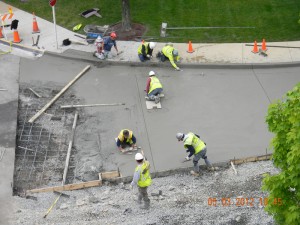 All good things must come to an end. Eventually even asphalt reaches the end of its life cycle and needs to be replaced. There are two techniques for completing a re-construction project: Full Depth Replacement and Mill & Pave. PTG Enterprises performs both types of projects and can help you determine which makes the most sense for your Baltimore business.
All good things must come to an end. Eventually even asphalt reaches the end of its life cycle and needs to be replaced. There are two techniques for completing a re-construction project: Full Depth Replacement and Mill & Pave. PTG Enterprises performs both types of projects and can help you determine which makes the most sense for your Baltimore business.
Click Here to schedule a site visit!
How to Mill & Pave a Parking Lot, Keeping Your Baltimore Business Beautiful
What is Mill & Pave?
Asphalt may seem tough and durable, but add up the effects of traffic and the elements, and you’ll see how quickly commercial asphalt can wear down. Eventually, it will need to be re-paved. This is where Mill & Pave comes in.
Asphalt milling and paving is a cost-effective and environmentally friendly way to repair damaged parking lots and roads. Using a “milling” machine, your asphalt contractor will remove the deteriorated layer of asphalt down to a specific depth. The newly grinded surfaced is then layered with tack before being re-paved with a fresh new coat of asphalt. The millings are then hauled offsite where they can be recycled. Did we mention that asphalt is America’s most recycled and reused material? Click Here to learn more.
What Makes PTG Unique?
PTG Enterprises has paved thousands of miles of asphalt lots, and our crews work quickly and professionally. But that is not what makes us unique. Unlike those other asphalt contractors, we care about you and your business. In fact, when you hire PTG, you’ll work with owner Patrick Gillen from start to finish, from the initial site visit and pre-construction meeting to the final walk-through. With PTG each phase of the project will be executed with an attention to detail that other asphalt paving contractors don’t possess.
We have been in the paving business for more than a decade and have managed hundreds of pavement projects throughout Baltimore, Maryland, Washington DC, and Virginia.
If you have any questions about Mill & Pave, please contact PTG Enterprises today by calling 410-636-8777, or click here today! You can check us out on Facebook and Twitter as well!


























